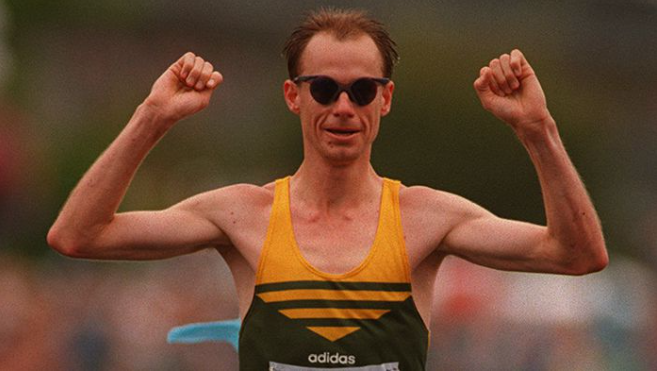
For Steve Moneghetti, his first cross-country race is a strong memory.
At Lake Burrumbeet, just outside his hometown of Ballarat, it was also the young Moneghetti’s first-ever race.
“My first-ever race introduced me to cross-country, and I loved it. I was 13 or 14 and it would have been an under-15 race. It was over a couple of laps of the racecourse.
“The social environment, everyone from eight to 80 was there, cup of tea and a chat afterwards. I loved it. I’d played team sports up until then but running was all about your own performance. You had control.”
If Moneghetti was made for cross-country, then cross-country also seemed made for Moneghetti. His fourth place at Stavanger in 1989 is the highest placing ever achieved by an Australian male at the world cross-country championships.
Moneghetti’s career was built around his training in the forests surrounding Ballarat, where he has lived his whole life.
“The places that define me are forest and cross-country,” Moneghetti says. He is perhaps better known for his road – world championships marathon bronze medal, Commonwealth gold, silver and bronze medals – performances, Moneghetti places his cross-country career above his road achievements.
“If I had to define the perfect race for me, I’d say a half-marathon cross-country. I’ve won national junior and senior cross-country titles, and senior 10,000 titles, but never a 5000 title either junior or senior.”
Moneghetti made his first appearance at a world cross-country in 1985, finishing an inauspicious 101st in Lisbon. He improved around 80 places the following year in Neuchatel when he also secured a spot in the Commonwealth Games team for Edinburgh by running less than a second faster than the selection standard at 10,000 metres.
“Until the Commonwealth Games in 1986, I hadn’t thought I would make a national team other than at cross-country.” He kept making the cross-country teams for almost 20 years, making his final appearance in Brussels in 2004.
It was in Stavanger in 1989 that Moneghetti hit peak cross-country. Racing over a course which a severe spring storm the day before the race had turned into a sea of mud, Moneghetti stormed from the middle of the 200-strong field mid-race to fourth place, just a couple of seconds out of a bronze medal.
It was the best finish by an Australian man, just edging the sixth-place finishes by Rob de Castella in 1981 and 1983.
Three years later Moneghetti finished sixth in Boston, another race run in tough conditions. It snowed on race day presenting competitors with a combination of cold, snow and slush.
Moneghetti ranks the Boston run more highly. Comparing the pair, he says of Stavanger that “I was so far back that I was shocked to get as high as fourth,” whereas in Boston “it was in my mind that I could get a medal.
As in Stavanger, Kenya’s John Ngugi won comfortably, but a chasing group of 6-10 runners remained in contention for the minor medals.
“With about around 1000 metres to go, I was in a pack and going pretty strongly. I thought to myself ‘I could win a medal here’,” Moneghetti recalls. He missed out by just five seconds.
“I was closer to the winner that day.”
Those two world cross-country performances and an earlier win in the 1986 World Universities cross-country underline what a fine runner Moneghetti is over muddy ground.
“I run light on my feet,” he says, “and that’s served me well in wet and muddy conditions. I don’t know, I just scoot across the ground.”
More generally Moneghetti adds: “Cross-country breaks your rhythm all the time and you’ve got to get that rhythm back. It can be frustrating, but I saw it as a challenge rather than a frustration” (no doubt to the frustration of many opponents).
Moneghetti “retired” after the Sydney 2000 Olympic marathon famously signing off a trackside interview with an “over and out.” But he relented to run the world cross-country twice more, in 2001 in Ostend and 2004 in Brussels. ‘Monner’ helped get a strong team together on the latter occasion: his 30th-place finish along with Craig Mottram (13), Lee Troop (21) and Brett Cartwright (37) made him a scoring member in the team which finished fifth, one place short of Australia’s best-ever men’s finish.
Brussels also brought Benita Willis’s victory in the women’s long race, the only individual world cross-country medal won by an Australian.
“Seeing Benita win was a memorable experience,” said the man who, until that moment, had finished higher in a world cross-country than any other Australian.
A most appropriate baton pass.
By Len Johnson for WXC Bathurst 2023

